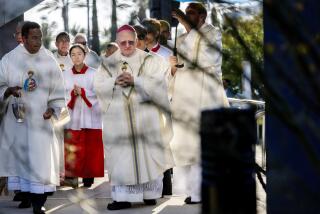Episcopal Woman Priest Drops Desire to Be Bishop
- Share via
INDIANAPOLIS — Ten years ago, she called herself “God’s favorite lady” and wanted to become a bishop.
Today, the Rev. Jacqueline Means, the first woman to be regularly ordained in the Episcopal Church, has dropped the nickname and decided to leave the job of woman bishop to someone else.
There are six women priests and three women deacons in the Indianapolis Episcopal Diocese, and Means, who was ordained in January, 1987, feels they are accepted much more easily now.
“The first five years were pretty hard--to be accepted and to be able to move about and do your ministry,” she said. “The biggest horror I had was the fear of making a mistake.”
After the first three or four years, she said, she realized that “I really don’t have to do better than anybody else.”
The first years of her priesthood were made more difficult by a divorce from her husband of 27 years and his death. Three years later, there was a second divorce.
The 50-year-old grandmother of six has seen her ministry change from one-to-one counseling of inmates at the Indiana Women’s Prison and the Marion County Jail to serving as administrator of the Episcopal Diocese Correctional Ministries.
She chairs the special ministries units for the Greater Indianapolis Church Federation and the Indiana Council of Churches.
She also chairs the Coalition against the Death Penalty for Juveniles, is a director of the Cummins Mental Health Center in Hendricks County, and is a member of the Indianapolis Metro Council, the Indiana Juvenile Justice Task Force and the Indiana Interreligious Coalition for Human Equality.
Also, she is rector of St. Mark’s Church in Plainfield, where attendance has doubled since her tenure began two years ago.
She counts that as one of her major accomplishments, along with the establishment of the Craine House, a halfway house and a prison alternative for women inmates, run by the diocese.
She also helped establish the camping program for residents of the Rockville Training Camp and the state boys and girls detention schools, and a program in which volunteers are trained and then visit inmates on a one-to-one basis for two years.
“I think the church has made a complete change in getting involved with people,” she said, citing as examples the feeding, clothing and advocacy programs of the church.
In the next 10 years, she said, she may move from prison ministries into full-time parish work. “Right now I have the best of both worlds,” she said. “Is there enough there (in parish work) to keep me busy and happy?”
More to Read
Sign up for Essential California
The most important California stories and recommendations in your inbox every morning.
You may occasionally receive promotional content from the Los Angeles Times.










